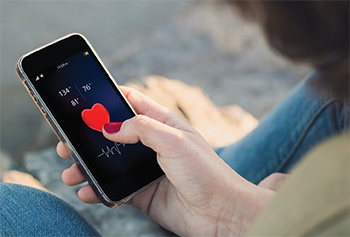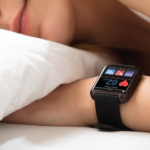
Georgejmclittle / shutterstock.com
CHICAGO—Approximately 200,000 health apps are available through major app stores. Some offer real benefits, said Brennan Spiegel, MD, MSHS, director of health services research at Cedars-Sinai Health System, Los Angeles, Calif. But most, he told attendees at the 2018 ACR/ARHP Annual Meeting, are “rubbish.”
“They do one or two things only—and generally not well,” he said. Health technology and apps work when they are attuned to patient needs, do not overwhelm people with alerts and are complex or subtle enough to weave into a person’s life. Most don’t do these things, he said.
How to figure out what works? Some—but not much—research is available.
Dr. Spiegel and his colleagues performed a meta-analysis of sufficiently rigorous research on how well wearable technology helps patients. This research included randomized controlled trials, one group that used wearable sensors to send data back to healthcare providers to help make decisions, one group that didn’t and the clinically important outcomes measured.1 Across all of medicine, only 27 trials met those criteria, with “very, very few in rheumatology,” Dr. Spiegel said.
The research showed trends toward body mass index reduction, blood pressure reduction and other improvements, but only trends. “We did not find a statistically significant benefit of using these sensors on any clinical outcome that we could find,” he said. But, looking more closely at the results of individual studies, they found some useful patterns.
Done poorly, apps could actually harm health, Dr. Spiegel said.
What Works & What Doesn’t
What doesn’t work, they found, is simply handing someone a tracker to monitor their steps, heart rate and other measures. Generic motivational messages, paying people to use technology for health, and constant, intrusive messages are also no-no’s, Dr. Spiegel said.
Apps more likely to work are combined with other support programs, offer social incentives such as sharing and competing with friends, avoid alert fatigue and offer hyper-personalization that calibrates itself based on where a person is in their process.
Dr. Spiegel emphasized the hyper-personalization. These apps really listen to the user, provide tailored guidance and consider someone’s “readiness for change.” Someone contemplating whether their pain may need to be managed differently, with different messaging or motivation, than someone already taking measures to do so.
Done poorly, apps could actually harm health, Dr. Spiegel said.
“There is at least one randomized, controlled trial that shows people gain weight—not lose weight, they gain weight—when they’re randomized to using wearable biosensors because they kind of get tired of being judged by the computer that they’re not walking enough,” he said. A better approach might be to send a message, based on the weather, that says something like, “When you’re ready to start exercising, today would be a good day to go out for a walk.”
“If you’re going to recommend apps to your patients, recommend apps that acknowledge the behavioral aspects of healthcare,” he said.
Researchers at Cedars-Sinai, knowing that getting up and walking is important after surgery, closely tracked patients’ walking habits. They found the chances of early discharge were much higher if patients could walk 1,000 steps on their post-
operative day, and another study has found that every 1,000 steps a day taken by advanced cancer patients was associated with reduced odds for adverse events in chemotherapy, and with reduced odds for hospitalization and reduced hazard ratio for death.2


